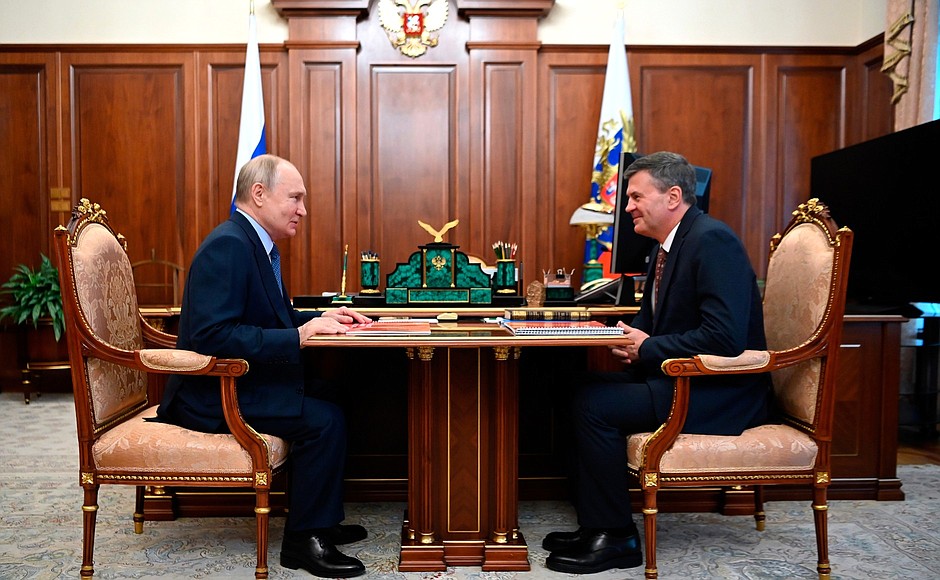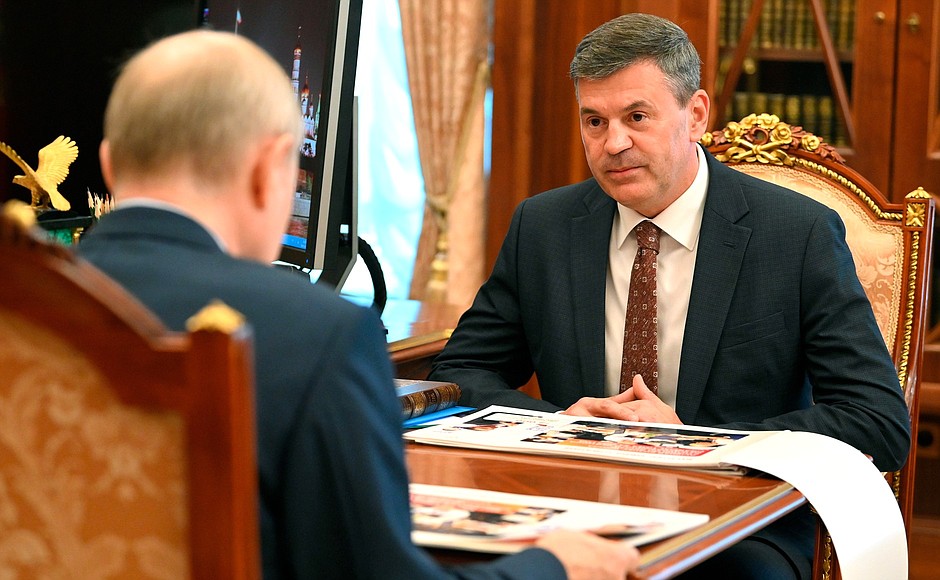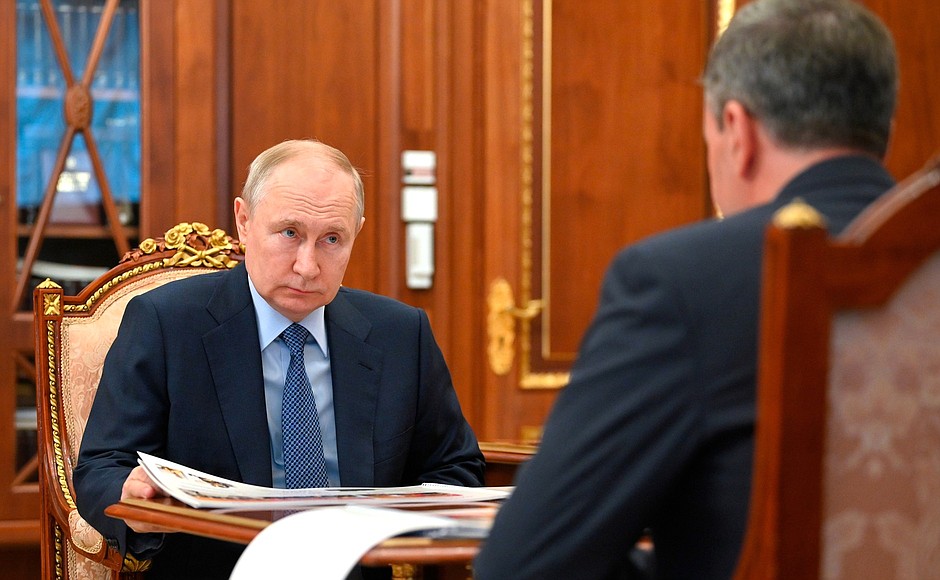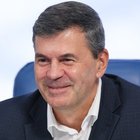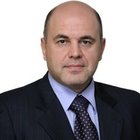President of Russia Vladimir Putin: You have recently started your work as the Academy’s rector, but there is probably nothing new for you at RANEPA because you had served as deputy rector for many years.
Rector of the Russian Presidential Academy of National Economy and Public Administration Alexei Komissarov: Still, I learn something new all the time.
Vladimir Putin: Of course, this is a new role, I understand.
Alexei Komissarov: I would like to thank you and Mikhail Mishustin for your trust because it is a great honour to head theRussian Presidential Academy of National Economy and Public Administration. Of course, this is also a tremendous responsibility. However, our team will do everything possible to make sure that the Academy retains its presidential status and is up to the mark.
If I may, I would like to say a few words about the Academy.
Vladimir Putin: Yes, of course.
Alexei Komissarov: It is, indeed, a unique institution, mostly in terms of its scale. This is the largest education institution in Europe, it has 47 branches. Indeed, it has a tremendous scale and offers numerous programmes and curricula.
Of course, it actively trains future civil servants. You know very well about the school of governors that has trained 50 regional heads to date. In the past 12 years, we have trained about 400,000 civil and municipal servants. This is a very powerful programme indeed.
Apart from public administration, we have a well-developed business education system. A 2022 international ranking survey listed our business school as the best business school in the country. Each year, we train about 2,000 students under various business programmes.
We have a highly developed research sector. We have two Russian Academy of Sciences members and nine associate members on our staff, as well as numerous professors with DSc degrees. In all, the academy has 127 doctors of science who implement a large volume of research.
We are proud of our students. I greatly admire their talents and abilities. The student council has become the best in Moscow. We offer multiple activities, substantial sport opportunities and many other things that bring students together and make their student years unforgettable.
At the moment we pay special attention to patriotic upbringing, of course. We regard this as very important. The Academy has created a military training centre; it is very active academically and there is a huge number of students competing for each place, since a lot of young people want to enrol.
The Avangard Patriotic Club has numerous projects to support the special military operation. They collect humanitarian aid, write letters [to soldiers at the front], and render our fighters all kinds of support. We also invite some of them to speak before student audiences. So, this work is being pursued. I think it is extremely important.
At your instructions, we train state municipal employees from our new regions. In all, 12,000 people will take a course of training until the end of this year.
There are also certain specific kinds of work related to training social coordinators for the fund you have established – the Defenders of the Fatherland State Fund. This is also a highly important and necessary work: people should understand and be as attentive, polite and cordial towards those who need this help as possible.
Yet another educational programme is entitled Russia’s DNA. Under this programme, teachers are taught the basics of Russian statehood, because, regrettably, there were different approaches to this subject in the past.
We have launched a training programme for those who want to choose civil service as their career right after school. We have compiled this programme and entitled it Russia’s Resources.
According to your recent instructions, we are launching a school for city mayors in cooperation with the Senezh Management Workshop (Russia – Land of Opportunity); jointly with Znaniye Society, we will create an open training platform to be used by a large number of people. Add to this classroom programmes that are also very important and needed.
For us, RANERA is primarily a Presidential Academy; this is our second name under the Charter. And of course, we have to work hard to be worthy of this high title. As of next year, we want to set higher requirements for the average grade under the Unified State Exam to encourage stronger school leavers to join the Academy. And, of course, it is necessary to work on the curricula and audit them.
Vladimir Putin: Who will do the auditing? The audit should be independent.
Alexei Komissarov: We invite consultants from the outside. Currently we ask teachers from other universities to come. There was a lot of resistance, because some of our people were reluctant to get outsiders involved in our business. But it is all right; we tell everyone that we are doing this for the overall good.
We are launching a corporate university, though it may not be the right name, for teachers and professors so that they themselves… I really wish there were more young faculty members, and those who are not so young should also feel that they are taken care of, that they are developing and can pass on their knowledge and skills.
It is very important because, as far as I know, there is no format for teachers’ training on a large scale, and now we want to create it.
We are also working on upgrading infrastructure in St Petersburg, in Moscow. You can just leaf through it. We are building new cafeterias, creating courtyards, repairing campuses. We want to do everything to make sure that infrastructure…
Vladimir Putin: Mr Komissarov, what do you mean by mobilising research potential? What is mobilisation of research potential?
Alexei Komissarov: Perhaps it is not the best term to use but, when it comes to research, the situation is quite interesting. On the one hand, the research base is very strong and we have many experts and researchers. On the other hand, as it often happens in science, people do what they really love and there is nothing wrong with this; but my team strongly believes that we should employ the Academy’s research potential to address the most topical tasks.
We are discussing with the Government and the Presidential Executive Office what can be done so that the Academy can be helpful to the Government. I have great respect for research and science but I want the Academy to bring utmost benefit to the country.
Vladimir Putin: Good thinking. Both the Government and the Executive Office hire staff from outside, which is a good practice. Of course, since we have a base like RANEPA we should take advantage of this asset when the Government and the Executive Office work on their decisions. Of course, this should be a basic structure.
Alexei Komissarov: I want to give a brief comment if you allow me. We are discussing restoring the tradition of the Tsarskoye Selo Lyceum in St Petersburg. You most certainly know about this unique institution and its history. We believe it would be wonderful to recreate it.
Vladimir Putin: As an education institution?
Alexei Komissarov: Yes, as an education institution, to train young people interested in civil service, cultivate patriotism and give them the best possible education.
Vladimir Putin: Do you want to restore it in the same premises? It is currently a museum.
Alexei Komissarov: We are considering different options. There are premises that could be used. The historical premises could be used partly and the new premises partly as well. We are not asking for any funding right now. We will try to find the money and opportunities ourselves and will later show you the finished project. But, of course, we need your support because, if we create a lyceum of this level, it should be a lyceum under the President of the Russian Federation.
Vladimir Putin: Sounds good.
Alexei Komissarov: Mr President, if I may, on behalf of our students, faculty and staff, I would like to invite you to visit the Academy. It will be a great honour for us and a good motivation to improve.
Vladimir Putin: Thank you very much.
<…>
